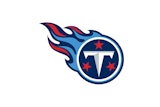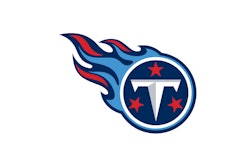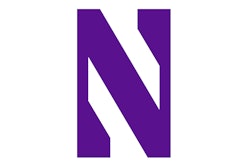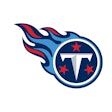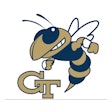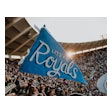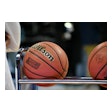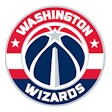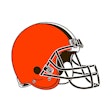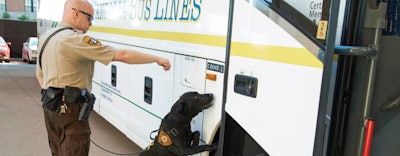
The Chicago Cubs had already shut out the visiting San Francisco Giants, 2-0, on Aug. 9 when postgame stragglers were ordered to evacuate Wrigley Field. Chicago Police, who reportedly receive dozens of bomb threats every week, got word that Wrigley had been targeted and swarmed the ballpark with officers. Only after bomb-sniffing dogs had their run of the grounds was an "all clear" issued.
"Following our game this afternoon, we received a bomb threat and took swift action to clear the few remaining fans, players, staff and media from the ballpark," the Cubs said in a statement. "After a thorough search by law enforcement, no evidence was found to suggest this threat was credible. We take safety at Wrigley Field seriously and are working with law enforcement authorities to pursue the person who initiated this threat."
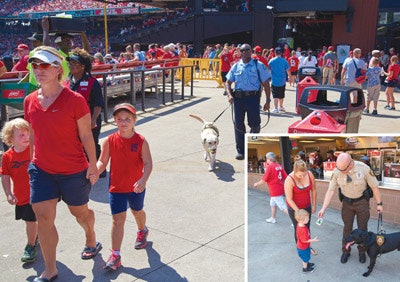 ROVERS The Cardinals' gameday security lineup includes two Labrador retrievers trained to mingle with large crowds.
ROVERS The Cardinals' gameday security lineup includes two Labrador retrievers trained to mingle with large crowds.
Major League Baseball's mandate that all 30 of its ballparks employ walkthrough metal detection as part of their perimeter screening procedures this season sent a clear message that the entire league is serious about fan safety. But a few teams have gone a step further, none more so than the Cubs' division rival in St. Louis, where bomb-detecting dogs have patrolled Busch Stadium and its surrounding area during every home game since the 2014 All-Star break.
Two Labrador retrievers, named Shug and Upshaw, sweep everything from player buses to boxes full of bobble heads. "If somebody wanted to smuggle explosives in a backpack or plant something, we really didn't have much that could detect and stop that," says the Cardinals' director of security and special services Joe Walsh. "With the emphasis on stopping guns, knives and other weapons coming in the gates with the metal detection that was mandated by MLB, we felt that this was a great complement."
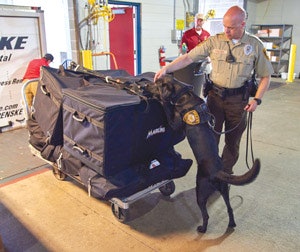 SMELL TEST Shug and his St. Louis County Police handler clear Miami Marlins equipment bags before an August series at Busch Stadium.
SMELL TEST Shug and his St. Louis County Police handler clear Miami Marlins equipment bags before an August series at Busch Stadium.
Moreover, the dogs represent a new breed of bomb-detecting "technology," the word given to the identification and training of dogs capable not only of sniffing out explosives in static environments, but when carried on a person. Called Vapor Wake®, this type of bomb detection involves the trained dog sampling suspect airborne particles from a human's wake and tracing the scent back to its source. This typically can be accomplished 45 seconds or more (depending on the amount of explosives carried and environmental factors such as heat, wind and topography) after a dog has crossed the suspect's wake. "The catalyst of all this was the shoe-bomber incident in 2001," says Todd Holt, CEO of Aniston, Ala.-based AMK9 Academy, commercial partner of Auburn University's Canine Detection Research Institute, which developed the patented training protocol. "Auburn said, 'We need to have a different kind of working dog, because it's no longer just planted explosives — it's body-worn explosives.' "
Canines possessing this capability have been found to outperform any manmade bomb-detection technology that the U.S. government has developed, despite its spending billions in the attempt, according to Holt. "The real unique part of Vapor Wake is the dog is trained to ignore objects," he says. "It is working with its nose up instead of its nose down. It's scenting the air and not the person, which is why it's so effective on body-worn explosives."
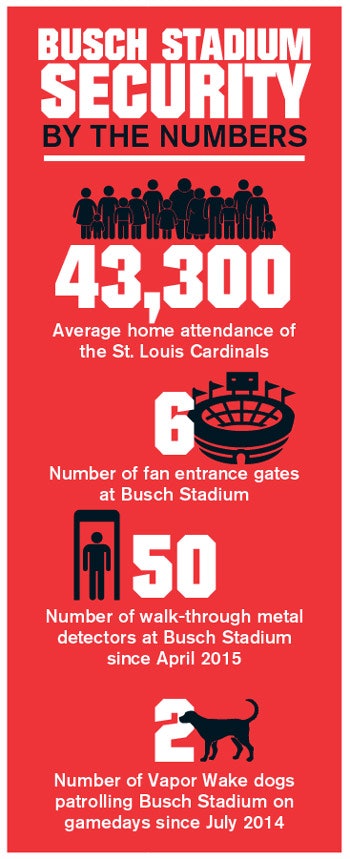
EARLY ADOPTER
The Cardinals are one of only a handful of major sports teams — pro and college — to commit to this level of canine security assistance. "I've been interested in this for a long time, and I always thought that when they developed this type of animal that it was the way to go for a big venue such as ours," says Walsh, a former police officer who first contacted Auburn 10 years ago, before personally visiting AMK9's 320-acre training facility.
According to Walsh, the Cardinals purchased Shug and Upshaw for $35,000 each and donated one dog each to city and county law enforcement. The team then pays each entity for use of the dogs and their handlers on gamedays. The dogs typically arrive three hours before the first pitch and remain onsite for roughly eight hours, including an hour of built-in downtime. "Can they go 24/7? No. They're animals. They have to rest for a little bit," Walsh says. "We've set up different places where they can go and get cooled for 30 minutes and then they're back on it again."
Moreover, the dogs represent a more covert screening than walkthrough magnetometers. "We have a street in between what we call Ballpark Village and the stadium that is open to the public," Walsh says. "We can actually patrol that street with these dogs and have a comfort level as we are screening people walking by without them really even knowing they're being screened."
That the dogs are Labs is by design. Not only are they exceptional working dogs with a strong hunt drive, they are not intimidating. "One of the reasons we use the floppy-eared dogs for Vapor Wake is because we don't want to scare away the fans," Holt says. "If you had a German Shepherd or a Belgian Malinois, a pointy-eared dog that's known as a biting dog, you'd have people walking around them and looking back behind themselves, and they would be afraid of it."
The dogs can be outfitted with "do not pet" collars, but fan interaction is inevitable and not necessarily discouraged. "If there is a six-year-old boy who comes up to the dog, our handler will allow the boy to interact with the dog, but we're there to protect people, and that's our main priority," Holt says. "There's a balance. If we're stopping and letting people love on the dogs, then we're not able to do our job and effectively screen people."
"They're very friendly," Walsh says of Shug and Upshaw. "They love walking between people, and that's basically what we want them to do — mingle into the crowd. It's all about layering different types of protection for your building."
A BIG JOB
St. Louis ranks second only to the Los Angeles Dodgers in terms of average home attendance, drawing more than 43,000 fans per game. Busch Stadium is served by six large gates and roughly 50 metal detectors, Walsh says. It is protected on gamedays by a combined 35 city and county police officers, as well as three private security details — one hired by concessionaire Sportservice, a second company that secures the actual building 24/7, and a third that assists with metal detection — for an additional 60 to 70 individuals focused solely on security. And beginning this year, the team has employed a retired TSA agent who is a certified bomb expert — an actual human being on site to help in the dogs' ongoing training and to investigate any suspect scenarios uncovered by Shug and Upshaw. As of this writing, there hasn't been one.
But the Cardinals aren't about to get complacent. Ultimately, Walsh would like the team to employ as many as six dogs on gameday. "I started with two because I knew I had a learning curve trying to manage this," he says.
The ideal number of dogs in any given sports environment will vary. "We like to do a security assessment based on the facility, and it's based less on the number of fans than on the entry access for fans — the number of gates or entry control points," Holt says. "A gate at an Auburn football game may be very different than a gate at the Atlanta Braves stadium. A stadium may have 10 gates, but you can have an outside perimeter that funnels people through two or three entry control points. And that's what we recommend — one dog per entry control point."
For Walsh, the peace of mind justifies the investment, which includes paying a full day's wages for each dog's handler for a minimum of 81 days a season. "It's not what I would call cheap," he says. "But I think it's another useful tool that the bad guys have to think about."
"People have budgets they have to manage, and I understand that completely," Holt says. "But I think the early adopters look at it and say, 'You know what? At the end of the day, this is pretty cheap insurance to provide some protection for the value of this franchise, for the value of this facility, for the value of this league.' "
AMK9 Academy is currently in discussions with the organizers of golf tournaments and marathon events, and given this summer's widely scrutinized gun violence and the ability of specially trained Vapor Wake dogs to detect firearms on individuals, a new market has emerged — movie theaters. "Whether it's the theater companies or the sports teams, people want better security, but they also don't want to deteriorate the fan experience, or the patron experience," Holt says. "And they see Vapor Wake as a way to get both of those things — you're going to get the added security, but you're not going to impede the traffic flow of your customers or your fans, because the people don't have to stop and let a dog search them, like a traditional bomb dog. They can just continue to walk freely as they normally would and the dog is effectively screening that flow of pedestrians for explosives."
This article originally appeared in the Fall 2015 issue of Gameday Security with the title "Clearing the Air"










